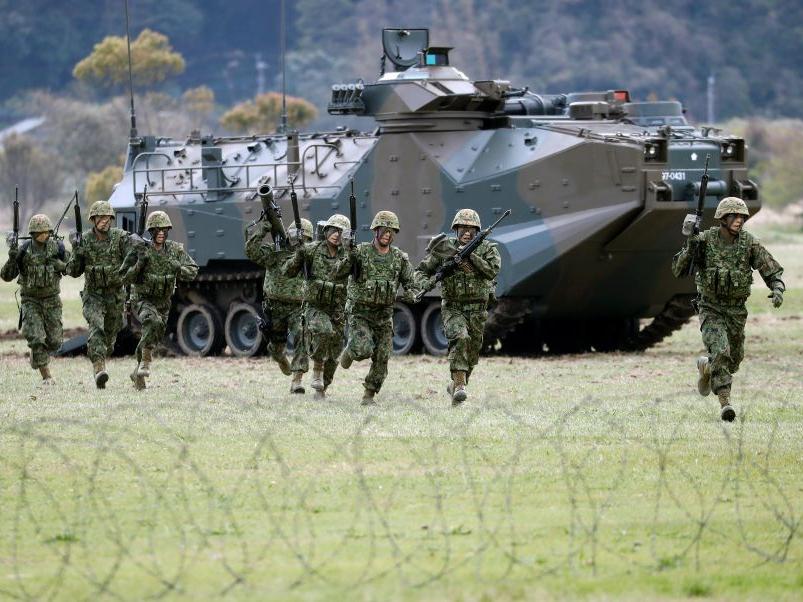Japan activates first marine unit since Second World War to bolster defences against China
'Given the increasingly difficult defence and security situation surrounding Japan, defence of our islands has become a critical mandate'

Japan has activated its first marine unit since the Second World War to bolster its defences against China.
They will be trained to counter invaders on Japanese islands along the edge of the East China Sea which it fears could be vulnerable to attack by China.
After taking office in 2012, Japan’s prime minister, Shinzo Abe, has been wary of the rise of China. In November last year, he met with Chinese President Xi Jinping and discussed amending their countries often troubled relationship, which has been tainted with hostility since the end of the Second World War.
Both leaders emerged from the talks with feelings of optimism and expressed a shared commitment to solving the problems of Kim Jong-un’s aggressive regime in North Korea.
As China has continued its expansion in the disputed South China Sea, new fears have arisen in Tokyo.
In a ceremony held at a military base near Sasebo on the south-west island of Kyushu, around 1,500 members of the Amphibious Rapid Deployment Brigade (ARDB) wearing camouflage lined up outside amid cold, windy weather.
“Given the increasingly difficult defence and security situation surrounding Japan, defence of our islands has become a critical mandate,” Tomohiro Yamamoto, vice defence minister, said.
The troops conducted a 20-minute mock exercise for the public, which saw them recapture a remote island from invaders.
The formation of the Japanese marine brigade is controversial because amphibious units can project military force and could, critics warned, be used to threaten Japan’s neighbours.
In its post-Second World War constitution Japan renounced the right to wage war.
The brigade is the latest component of a growing marine force that includes helicopter carriers, amphibious ships, Osprey tilt-rotor troop carriers and amphibious assault vehicles, meant to deter China as it pushes for easier access to the Western Pacific.
China, which dominates the South China Sea, is outpacing Japan in defence spending. In 2018, Beijing which claims a group of uninhabited islets in the East China Sea controlled by Tokyo, will spend 1.11 trillion yuan (£125.33bn) on its armed forces, more than three times as much as Japan.
The activation of the 2,100 strong ARDB takes Japan a step closer to creating a force similar to a US Marine Expeditionary Unit (MEU) able to plan and execute operations at sea far from its home base.
“They’ve already demonstrated the ability to put together an ad hoc MEU. But to have a solid, standing MEU capability requires concerted effort,” said Grant Newsham, a research fellow at the Japan Forum for Strategic Studies.
“If Japan put its mind to it, within a year or year and a half it could have a reasonable capability.”
In January, Japan protested to China over a Chinese military vessel entering waters in the East China sea, near disputed islands.
The recent events mark ongoing conflicts between geopolitical forces within the region, including the United States, who are expanding their presence amid rising hostility from North Korea.
Pyongyang is currently experiencing increasing isolation from its neighbours because of its nuclear programme and could be excluded from the 2020 Tokyo Summer Olympics. However, the International Olympic Committee has said Kim Jong-un is committed to having North Korea participate in the 2020 games.
Additional reporting from Reuters
Join our commenting forum
Join thought-provoking conversations, follow other Independent readers and see their replies
0Comments